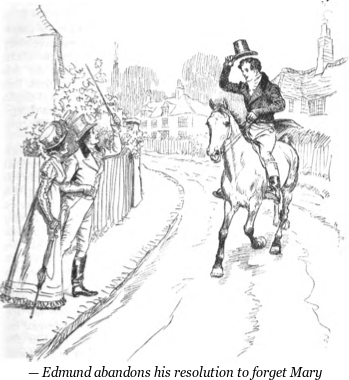This is fourth in a series of guest posts written by “Sophie” of A Reasonable Quantity of Butter in celebration of Mansfield Park’s bicentennial.
***
Did Mary Crawford truly love Edmund Bertram? Put another way, this question could read, “Did Rosamund Vincy truly love Tertius Lydgate?” Or, does a woman truly love a man devoted to his profession, if she despises his profession? According to Tertius, the answer is “no”.
“Do you know, Tertius, I often wish you had not been a medical man.”
“Nay, Rosy, don’t say that,” said Lydgate, drawing her closer to him. “That is like saying you wish you had married another man.”
“Not at all; you are clever enough for anything: you might easily have been something else. . . . I do not think it is a nice profession, dear.” We know that she had much quiet perseverance in her opinion.
“It is the grandest profession in the world, Rosamond,” said Lydgate, gravely. “And to say that you love me without loving the medical man in me, is the same sort of thing as to say that you like eating a peach but don’t like its flavor. Don’t say that again, dear, it pains me.”1
 In a strikingly similar conversation, this question first occurs to Edmund and Mary:
In a strikingly similar conversation, this question first occurs to Edmund and Mary:
“But why are you to be a clergyman? I thought that was always the lot of the youngest, where there were many to chuse before him.”
“Do you think the church itself never chosen, then?”
“Never is a black word. But yes, in the never of conversation, which means not very often, I do think it. For what is to be done in the church? Men love to distinguish themselves, and in either of the other lines distinction may be gained, but not in the church. A clergyman is nothing.”
“The nothing of conversation has its gradations, I hope, as well as the never. A clergyman cannot be high in state or fashion. He must not head mobs, or set the ton in dress. But I cannot call that situation nothing which has the charge of all that is of the first importance to mankind, individually or collectively considered, temporally and eternally, which has the guardianship of religion and morals, and consequently of the manners which result from their influence.” . . .
“I am just as much surprised now as I was at first that you should intend to take orders. You really are fit for something better. Come, do change your mind. It is not too late. Go into the law.”2
Although Mary is more intelligent and kind than Rosamund, the two share values in marriage: money and position. Mary is aware of the discrepancies between Edmund and her ideals, but Rosamund thinks she has found them in Tertius. When she learns that she is mistaken, she attempts to conform Tertius to her ideals, ultimately ruining him and their marriage. Tertius is at first filled with ambition to do good through his work, but Rosamund’s behavior causes him to lose his respect for himself, and with it a greater part of his ability to do good.
Could a similar future have awaited Edmund and Mary? Tertius and Edmund were similar men—both gentle, serious, and dedicated to their vocations. Attraction to Mary had already lead Edmund to act against his conscience during the play, and Fanny fears that Edmund would do more of the same if he married Mary: “God grant that her influence do [sic] not make him cease to be respectable!”3
The nature of true love is not to ruin and destroy. It is to adhere, to respect, to support.
***
1Middlemarch, by George Eliot, Book V, ch. XLV
2Mansfield Park, by Jane Austen, ch. IX
3Ibid., ch. XLIV